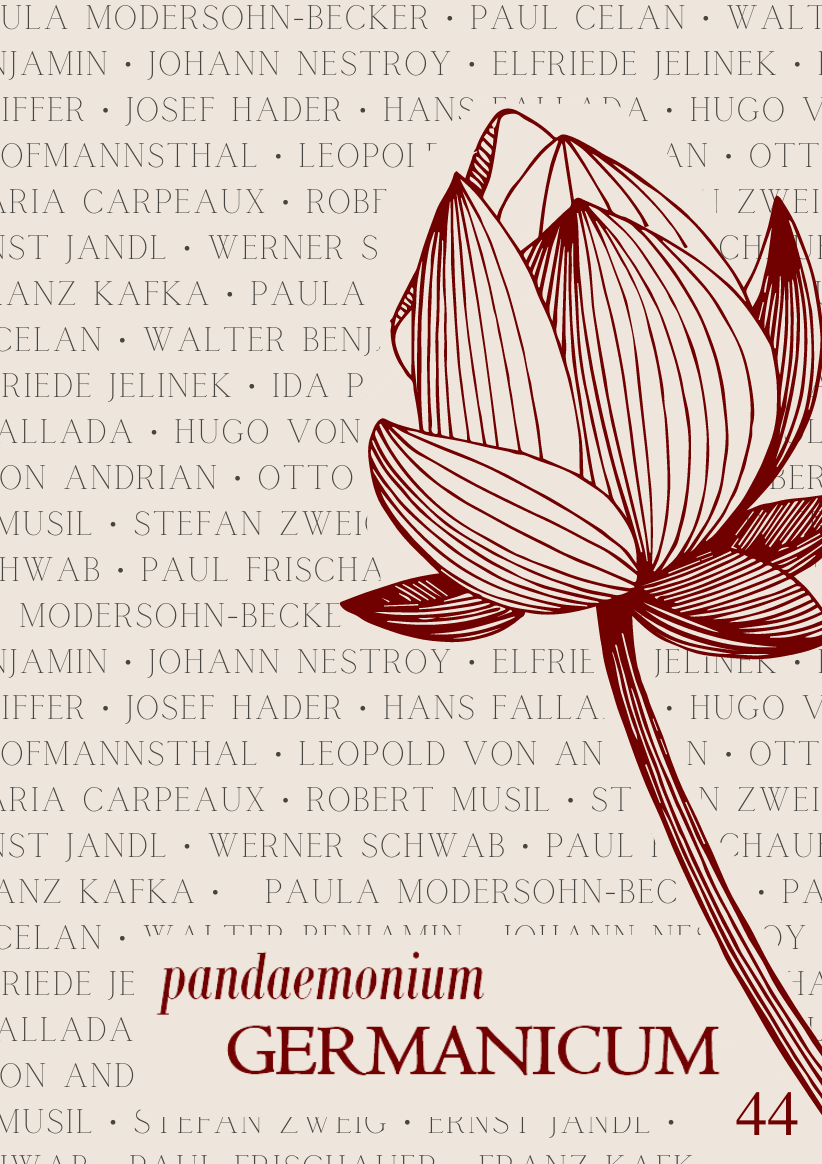Johann Nestroy, the ancestor of the Austrian avant-garde: when the language speaks and the translation does (not) get stuck
DOI:
https://doi.org/10.11606/1982-88372444246Keywords:
Johann Nestroy, Austrian literature, TranslationAbstract
Johann Nepomuk Nestroy (1801-1862) was one of the most important playwrights in the history of Austrian theater. He was an acclaimed actor and author during his time, and he is also a reference writer and a huge influence for many canonical Austrian writers in the 20th and early 21st centuries, who today define themselves as debtors of his dramaturgical poetics (for instance, Karl Kraus ou Elfriede Jelinek). The article highlights the role of Nestroy as an “ancestor” for part of Austrian literature, and also looks at the only translation of a Nestroy play available in Brazil (Cacique Vento-da-Tarde ou O festim do horror, 1990), in order to call into question the common view of Nestroy's work as “intranslatable”.
Downloads
References
AALTONEN, Sirkku. Time-Sharing on Stage: Drama Translation in Theatre and Society (Topics in Translation 17). Clevedon: Multilingual Matters Ltd., 2000.
ALBALADEJO, Juan Antonio. Los clásicos marginados: Johann Nestroy o la traducción imposible. In: CERNUDA, Miguel Ángel Vega (ed.). La traducción de los clásicos: problemas y perspectivas. Madrid: Universidad Complutense de Madrid, Instituto Universitario de Lenguas Modernas y Traductores, 2005, 297-304.
BASSNETT, Susan. Still Trapped in the Labyrinth: Further Reflexions on Translation an Theory. In: BASSNETT, S.; LEFEVERE, A. Constructing Cultures: Essays on Literary Translation. Clevedon/Philadelphia: Multilingual Matters, 1998, 90-108.
BOHUNOVSKY, Ruth; BACHMANN, Cristiane Gonçalves. Elfriede Jelinek – “Sombra (Eurídice diz)”. Belas Infiéis, v. 9, n. 2, 261-280, 2020. Disponível em: http://periodicos.unb.br/index.php/belasinfieis/article/view/27435/25746 (23/12/2020).
CARPEAUX, Otto Maria. A história concisa da literatura alemã. São Paulo: Faro Editorial, 2013.
THEATER AN DER JOSEPHSTADT. Das Mädl aus der Vorstadt. Programa da peça. Josephstadt, 2016.
FRANZEN, Jonathan. The Kraus Project: Essays by Karl Kraus. Translated and annotated by Jonathan Franzen. With assistance and additional notes from Paul Reitter and Daniel Kehlmann. New York: Farrar Straus & Giroux, 2013.
GOLLNER, Helmut. Johann Nestroy (1801-1862). In: ZEYRINGER, Klaus; GOLLNER, Helmut. Áustria: uma história literária. Literatura, cultura e sociedade desde 1650. Tradução e adaptação de Ruth Bohunovsky. Curitiba: Editora UFPR, 2019, 217-247.
GORBATENKO, M. “Nestroys Rezeption in Russland Oder: Wenn die Übersetzung auf viele Probleme stöβt und die Interpretation an der Gattungsinkongruenz scheitert”. In: KNAFL A. (Hg). Über(ge)setzt: Spuren zur österreichischen Literatur im fremdsprachigen Kontext. Wien: Praesens, 2010, 69-78.
HAIDA, Peter. Nestroy in der Bundesrepublik Deutschland”. Nestroyana, Jahrgang 7, Heft 3-4, 144-149, 1987.
HEIN, Jürgen. Rezeption. In: HEIN, Jürgen. Johann Nestroy. Stuttgart: Sammlung Metzler/J. B. Metzler, 1990, 123-135.
JELINEK, Elfriede. Ich renne mit dem Kopf gegen die Wand und verschwinde. Interview mit Rose-Maria Gropp und Hubert Spiegel. Frankfurter Allgemeine Zeitung, Frankfurt, 8 nov. 2004. Bücher, 35. Disponível em: http://www.faz.net/aktuell/feuilleton/buecher/elfriede-jelinek-ich-renne-mit-dem-kopf-gegen-die-wand-und-verschwinde-1196979.html (13/12/2020).
JELINEK, Elfriede. Lust. Hamburg: Rowohlt. 1992.
JELINEK, Elfriede. sich mit der Sprache spielen: Johann Nestroy. Elfriede Jelinek, 2001. Disponível em: http://www.elfriedejelinek.com/fnestroy.htm/ (22/12/2020).
JELINEK, Elfriede. Theaterstücke: Was geschah, nachdem Nora ihren Mann verlassen hatte oder Stützen der Gesellschaften/ Clara S. musikalische Tragödie/ Burgtheater/ Krankheit oder Moderne Frauen. Hamburg: Rowohlt, 2018.
KRAUS, Karl. „Nestroy und die Nachwelt – Zum 50. Todestage“. In: FRANZEN, Jonathan. The Kraus Project: Essays by Karl Kraus. Translated and annotated by Jonathan Franzen. With assistance and additional notes from Paul Reitter and Daniel Kehlmann. New York: Farrar Straus & Giroux, 2013, 134-260.
KRAUS, Karl. Os últimos dias da humanidade. Tradução de Mariana Ribeiro de Souza. São Paulo: Balão Editorial, 2017.
NESTROY, Johann Nepomuk. Cacique Vento-da-Tarde ou O festim do horror. Opereta em um ato. Tradução de Celeste Aida Galeão e Walter Schorlies. Cadernos de Teatro Alemão (Instituto Goethe), n. 52, 1990.
NESTROY, Johann Nepomuk. Häuptling Abendwind oder Das gräuliche Festmahl. In: NESTROY, Johann Nepomuk. Sämtliche Werke. Historisch-kritische Gesamtausgabe. Herausgegeben von Fritz Brukner und Otto Rommel. v. 14. Wien, 1924–1930, 565-618, 1862. Disponível em: http://www.nestroy.at/neu/wp-content/uploads/2019/06/abendwind-sw.pdf (13/12/2020).
NESTROY, Johann. Der Talisman. 1840. Disponível em: http://www.nestroy- werke.at/index.php?r=play/viewpdf&id=40&pdfFile=171005.pdf&scroll=1 (13/12/2020).
NORD, Christiane. Funktionsgerechtigkeit und Loyalität. Theorie, Methode und Didaktik des funktionalen Übersetzens. Berlin: Frank & Timme, 2011.
SAGARRA, Eda. Nestroy’s “Häuptling Abendwind” as Post-Colonial Text? Austrian Studies, v. 15 (Austrian Satire and Other Essays), 53-64, 2007.
SCHMIDT-DENGLER, Wendelin. Nestroy – Die Launen des Glücks. Wien: Paul Zsolnay, 2001.
VOGEL, Juliane. Intertextualität. In: JANKE, Pia (Hrsg.). Jelinek-Handbuch. Stuttgart: Metzler, 2013, 47-55.
WINDLE, Kevin. The Translation of Drama. In: MALMKJÆR, Kirsten; WINDLE, Kevin (eds.). The Oxford Handbook of Translation Studies. Oxford: University Press, 2011.
ZEYRINGER, Klaus; GOLLNER, Helmut. Áustria: uma história literária. Literatura, cultura e sociedade desde 1650. Tradução e adaptação de Ruth Bohunovsky. Curitiba: Editora UFPR, 2019.
ZEYRINGER, Klaus; GOLLNER, Helmut. Eine Literaturgeschichte: Österreich seit 1650. Innsbruck: Studienverlag, 2012.
Downloads
Published
Issue
Section
License
Copyright (c) 2021 Pandaemonium Germanicum

This work is licensed under a Creative Commons Attribution-NonCommercial-NoDerivatives 4.0 International License.



